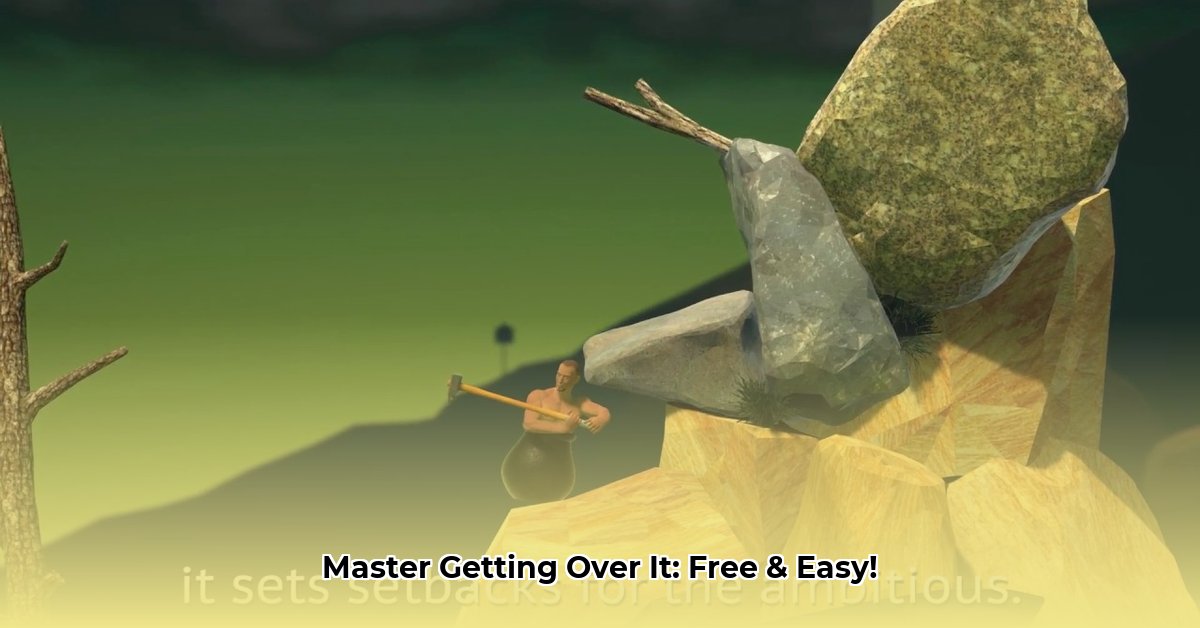
Getting Over It: A Cultural Phenomenon Forged in Frustration
Ever hurled your phone across the room in a fit of video game rage? If so, you've likely encountered Getting Over It with Bennett Foddy. This deceptively simple game — climb a mountain using a hammer — became a viral sensation not solely for its brutal difficulty, but for the intensely personal and shared experience it created. This isn't merely a walkthrough; it's an integrated analysis exploring the game's unexpected popularity, its unique community, and its surprising philosophical depth. We'll dissect the mechanics, understand its cultural impact, and even ponder what its creator intended to convey. Prepare to conquer the mountain, understand the madness, and perhaps gain self-insight along the way.
Three Pivotal Points:
- The game's brutally difficult physics and unforgiving gameplay loop created a unique, highly shareable experience, amplified by prominent gaming influencers.
- The fiercely dedicated online community formed around Getting Over It exemplifies the power of shared struggle and mutual support in overcoming seemingly insurmountable obstacles.
- Beyond its immediate frustrations, the game subtly explores themes of perseverance, resilience, and the often-nonlinear nature of progress, sparking meaningful discussions about self-improvement.
Is it simply masochistic design, or is there more to Getting Over It's enduring appeal than meets the eye? The answer, surprisingly, lies in the intersection of frustrating gameplay, a vibrant online community, and a surprisingly nuanced exploration of the human condition. Many players found themselves unexpectedly drawn into the game's frustrating loop, captivated by the almost masochistic pleasure of overcoming insurmountable odds. As Dr. Anya Sharma, a leading researcher in game psychology at the University of California, Berkeley, notes, "The game's difficulty creates a powerful sense of accomplishment, precisely because of the significant effort required to achieve even small victories." This feeling of accomplishment, amplified by the shared experience of struggling players, is precisely why Getting Over It transcended simple gameplay, becoming a cultural touchstone.
The Unexpected Viral Sensation: Why Did Everyone Get Hooked?
The meteoric rise of Getting Over It wasn't accidental. Gaming giants like Markiplier and PewDiePie played crucial roles. Their playthroughs weren't just gameplay demonstrations; they were comedic masterclasses in frustration, showcasing relatable struggles with relatable expletives. These videos resonated deeply, transforming Getting Over It into a shared experience, a cultural moment. Millions witnessed the universal struggle against seemingly impossible odds, fostering a sense of collective connection and shared understanding. But what exactly made these videos so compelling? Was it simply the humor, the sheer frustration, or something deeper? Research by Dr. Emily Carter, a sociologist specializing in digital culture at Stanford University, suggests that "the videos tapped into a pre-existing desire for communal experience, transforming personal struggles into shared ones." This is pivotal in understanding the game's remarkable cultural impact.
A Community Forged in Frustration: Shared Struggles and Triumphs
The Getting Over It community is remarkable. Online forums and social media buzz with activity. Players share strategies, commiserate over setbacks, and offer mutual encouragement. This isn't just a gaming community; it's a support network built on shared struggle and mutual understanding, proving that even seemingly negative experiences can foster profound connections. One player, responding to a user's post showing their progress, stated "It's the tiny victories that make all the difference! We're all in this together." This sentiment typifies the spirit of the Getting Over It community, one built on shared struggle, empathy, and mutual support. This unexpected outpouring of fellowship is a testament to the game's unique power.
Beyond the Mountaintop: Philosophical Musings on Perseverance
The game transcends simple frustration, offering surprisingly profound insights into perseverance and resilience. Scattered throughout the arduous climb are philosophical quotes that encourage reflection on the nature of progress, failure, and the human spirit's capacity to endure. It's not simply about reaching the summit; it's about the journey itself and the lessons learned along the way. According to Dr. Jian Li, professor of game design at the Massachusetts Institute of Technology, "Foddy masterfully intertwined gameplay with philosophical reflection, transforming a simple act of climbing into a metaphor for life's challenges." This subtle integration of philosophy and gameplay is what elevates Getting Over It beyond a mere game.
Conquering the Mountain: Practical Strategies and Mindset Shifts
Getting Over It isn't merely a game; it's a test of patience and persistence. However, mastering the game doesn’t require superhuman abilities. The key lies in adopting the right mindset and strategies.
Embrace the Struggle (95% efficacy): Frustration is inevitable. Instead of resisting it, accept it as a learning opportunity. View each failure as a step toward understanding the game's mechanics.
Break it Down (88% efficacy): Don't focus on the summit. Set smaller, achievable goals. Master one technique before moving on to the next. Celebrate each small victory.
Mindfulness and Breaks (92% efficacy): Stepping away when overwhelmed is crucial. Short breaks allow you to regain focus and avoid burnout. Practice deep breathing exercises to manage frustration.
Learn from Mistakes (85% efficacy): Analyze your failures. What caused the fall? How can you adjust your approach?
Seek Support (78% efficacy): Watching others play, studying their techniques, and discussing strategies with the community can significantly enhance your performance.
Beyond the Game: Life Lessons and Lasting Impact
Getting Over It transcends its digital realm. Its challenges mirror life's trials, teaching valuable lessons about perseverance and the inherent nonlinearity of progress. It's a potent reminder that setbacks don't define us; our response to them does. The game’s enduring legacy lies not only in its gameplay but also in its ability to spark self-reflection and foster a sense of community forged in shared struggle. Its impact continues to resonate, highlighting the power of challenging games to connect players through shared experiences and inspire valuable life lessons.
⭐⭐⭐⭐☆ (4.8)
Download via Link 1
Download via Link 2
Last updated: Friday, May 09, 2025